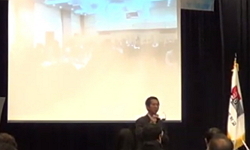In the knowledge and information society, everybody can enjoy benefits from informatization, and these benefits are increasing due to recent smart technologies. Everybody can also enjoy various information culture. With wide spread of information cult...
http://chineseinput.net/에서 pinyin(병음)방식으로 중국어를 변환할 수 있습니다.
변환된 중국어를 복사하여 사용하시면 됩니다.
- 中文 을 입력하시려면 zhongwen을 입력하시고 space를누르시면됩니다.
- 北京 을 입력하시려면 beijing을 입력하시고 space를 누르시면 됩니다.
부가정보
다국어 초록 (Multilingual Abstract)
In the knowledge and information society, everybody can enjoy benefits from informatization, and these benefits are increasing due to recent smart technologies. Everybody can also enjoy various information culture. With wide spread of information culture, modern people need a certain level of information literacy and application capability for daily living. Wide Spread of information culture requires everyone to have also some level of informatization. Therefore, the right measurement of informatization capability is a main task of a nation, a society, and an individual for improving its competitiveness. In this sense, Information Culture Index was first developed in 2008. The purpose of this study is to analyze correlation between vocation and Information Culture Index. For this purpose, a vocation is divided into 7 vocation groups and Information Culture Index is classified into 3 areas, Use, Cognition, and Norm, respectively. After thorough correlation analysis, there is a meaningful correlation: office job/technical post group shows higher Application capability while Farm Worker/Forest Employee/Livestock Employee/Fishery Operator group shows lower Application capability.
국문 초록 (Abstract)
현대지식정보사회에 있어서 모든 사람들은 정보화의 혜택을 받고 있으며, 최근 스마트 기술의 발달로 인하여 이러한 혜택을 날로 증가하고 있다. 또한 일상생활에서 다양한 정보문화를 즐...
현대지식정보사회에 있어서 모든 사람들은 정보화의 혜택을 받고 있으며, 최근 스마트 기술의 발달로 인하여 이러한 혜택을 날로 증가하고 있다. 또한 일상생활에서 다양한 정보문화를 즐기고 있다. 이러한 정보문화의 확산과 더불어 일상생활에 있어서 현대인들은 일정한 정보소양과 활용능력이 필요하게 되었다. 정보문화의 확산은 일정한 수준의 정보화능력을 필요로 하게 되었으며, 따라서 올바른 정보화 능력의 측정은 개인의 경쟁력뿐만 아니라 사회적으로 또한 국가적으로 매우 필요한 과업이 되어가고 있다. 이러한 측면에서 정보문화지수는 전 국민의 정보화수준을 올바로 측정하기 위해서 2008년 최초로 개발되었다. 본 연구의 목적은 직업과 정보문화지수와의 상관관계를 분석하기 위함이다. 구체적으로 직업을 7개 군으로 구분하여 정보문화지수의 3 영역 즉 활용, 인식 및 규범과 상관관계를 분석하였다. 상관관계분석결과 활용영역에서 사무직/기술직이 높은 점수로, 농/임/축/어업이 낮은 점수로 상관관계를 나타내었다.
참고문헌 (Reference)
1 National Information Society Agency, "2015 National Informatization White Paper" 2015
2 National Information Society Agency, "2014 National Informatization White Paper" 2014
3 National Information Society Agency, "2014 Information Culture Status Survey" NIA 2015
4 National Information Society Agency, "2013 National Informatization White Paper" 2013
5 National Information Society Agency, "2013 Information Culture Status Survey" 2014
6 National Information Society Agency, "2012 National Informatization White Paper" 2012
7 National Information Society Agency, "2012 Information Culture Status Survey" NIA 2013
8 National Information Society Agency, "2011 National Informatization White Paper" 2011
9 National Information Society Agency, "2010 Information Culture Status Survey" 2011
10 National Information Society Agency, "2008 Information Culture Status Survey" NIA 2009
1 National Information Society Agency, "2015 National Informatization White Paper" 2015
2 National Information Society Agency, "2014 National Informatization White Paper" 2014
3 National Information Society Agency, "2014 Information Culture Status Survey" NIA 2015
4 National Information Society Agency, "2013 National Informatization White Paper" 2013
5 National Information Society Agency, "2013 Information Culture Status Survey" 2014
6 National Information Society Agency, "2012 National Informatization White Paper" 2012
7 National Information Society Agency, "2012 Information Culture Status Survey" NIA 2013
8 National Information Society Agency, "2011 National Informatization White Paper" 2011
9 National Information Society Agency, "2010 Information Culture Status Survey" 2011
10 National Information Society Agency, "2008 Information Culture Status Survey" NIA 2009
동일학술지(권/호) 다른 논문
-
개인정보보호태도가 모바일뱅킹 수용의도에 미치는 영향에 있어 혁신성과 흡수역량의 조절효과 연구
- 사단법인 인문사회과학기술융합학회
- 홍재원
- 2016
- KCI등재
-
정보기술 기반의 글로벌 교육에서 토의용 학습 도구 개발
- 사단법인 인문사회과학기술융합학회
- 이희진
- 2016
- KCI등재
-
뉴로피드백을 이용한 로봇 발명 교육이 ADHD 아동의 주의집중력 변화에 미치는 영향
- 사단법인 인문사회과학기술융합학회
- 남현욱
- 2016
- KCI등재
-
- 사단법인 인문사회과학기술융합학회
- 김영아
- 2016
- KCI등재
분석정보
인용정보 인용지수 설명보기
학술지 이력
| 연월일 | 이력구분 | 이력상세 | 등재구분 |
|---|---|---|---|
| 2020 | 평가예정 | 신규평가 신청대상 (신규평가) | |
| 2019-12-01 | 평가 | 등재 탈락 (기타) | |
| 2019-01-01 | 평가 | 등재학술지 유지 (계속평가) |  |
| 2016-01-01 | 평가 | 등재학술지 선정 (계속평가) |  |
| 2014-01-01 | 평가 | 등재후보학술지 선정 (신규평가) |  |
학술지 인용정보
| 기준연도 | WOS-KCI 통합IF(2년) | KCIF(2년) | KCIF(3년) |
|---|---|---|---|
| 2016 | 0.33 | 0.33 | 0.32 |
| KCIF(4년) | KCIF(5년) | 중심성지수(3년) | 즉시성지수 |
| 0.33 | 0.32 | 0.407 | 0.14 |





 KCI
KCI 스콜라
스콜라






